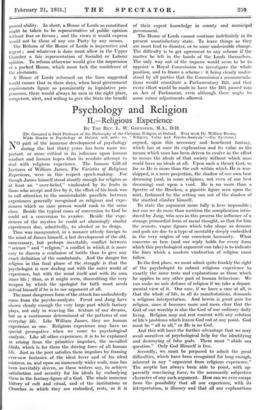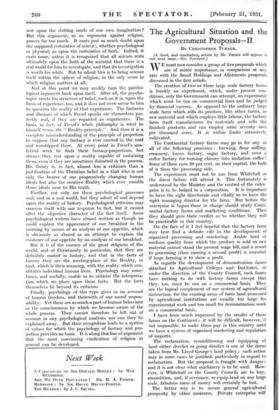Psychology and Religion
IL—Religious Experience By THE REV. L. W. GRENSTED, M.A., D.D.
[Dr. Grensted is Oriel Professor of the Philosophy of the Christian Religion at Oxford. Next week Dr. William Brown, Wilde Reader in Psychology at Oxford, will write on " Religion, Value and Psycho-Analysis."—En. Sinctator.]
NO part of the immense development of psychology during the last thirty years has been more im- portant or more critical in its influence upon human conduct and human hopes than its resolute attempt to deal with religious experience. The famous Gifford Lectures of William James, The Varieties of Religious Experience, were in this respect epoch-making. For though James himself stood stoutly enough for religion as at least an " over-belief," vindicated by its fruits in those who accept and live by it, the effect of his book was to call attention to the unmistakable parallels between experiences generally recognized as religious and expe- riences which no sane person would rank in the same class. Beside the typical cases of conversion to God he could set a conversion to avarice. Beside the expe- riences of the mystics he could set alarmingly similar experiences due, admittedly, to alcohol or to drugs.
Thus was inaugurated, in a manner utterly foreign to the mind of James himself, a last development of the old, unnecessary, but perhaps inevitable, conflict between " science " and " religion," a conflict in which it is more easy to discern a confusion of battle than to give any exact definition of the combatants. And the danger for religion in this final phase of the struggle is that the psychologist is now dealing not with the outer world of experience, but with the mind itself and with its own inner life ; thus, as it might seem, discrediting the very weapon by which the apologist for faith must needs defend himself if he is to use argument at all.
• The most dangerous form of the attack has undoubtedly come from the psycho-analysts. Freud and Jung have shown clearly enough the very large part which fantasy plays, not only in weaving the texture of our dreams, but as a continuous determinant of the patterns of our everyday life. Like William James, they see human experience as one. Religious experience may have no special prerogative when we come to psychological analysis. Like all other experience, it is to be explained as arising from the primitive impulses, the so-called libido, which is for them the driving force of all human life. Just as the poet satisfies these impulses by framing ever-new fantasies of the ideal lover and of his ideal mistress, so, and upon an immensely wider scale, man has been inevitably driven, so these writers say, to achieve satisfaction and security for his ideals by embodying them in the fantasy-figure of a God. The whole immense history of cult and ritual, and of the institutions or Churches in which they are embodied, rests, so it is argued, upon this necessary and beneficent fantasy, which has at once its explanation and its value as the means which man has been driven to evolve in the effort to secure the ideals of that society without which man could have no ideals at all. Upon such a theory God, so far as He is more than the cult within which He is wor- shipped, is a mere projection, the shadow of our own best dreaming (and, in some religions, not even of our best dreaming) cast upon a void. He is no more than a Spectre of the Brocken, a gigantic figure seen upon the mist, fashioned by the setting sun out of the shadow of the startled climber himself.
To state the argument more fully is here impossible ; nor can we do more than mention the complication intro- duced by Jung, who sees in this process the influence of a strange primordial form of racial thought, so that for him the remote, vague figures which take shape as demons and gods are due to a type of mentality deeply embedded in the very origins of our conscious humanity. What concerns us here (and our reply holds for every form which this psychological argument can take) is to indicate the lines which a modern vindication of religion must follow.
In the first place, we must admit quite frankly the right of the psychologist to submit religious experience to exactly the same tests and explanations as those which he applies to any other part of human behaviour. We can make no safe defence of religion if we take a depart.
mental view of it. Our case, if we have a case at all, is that the whole of life, in all its manifestations, demands `a religious interpretation. And herein is great gain for religion, since it becomes more and more clear that the God of our worship is also the God of our ordinary daily living. Religion may not rest content with any solution of life's problems which leaves God out at any point. God must be " all in all," or He is no God.
And this will have the further advantage that we may avail ourselves of psychological help for the identifying and destroying of false gods. These must " abide our question." Only God Himself is free.
Secondly, we must be prepared to admit the great difficulties, which have been recognized for long enough, inherent in any " argument from religious experience." The sceptic has always been able to point, with ap- parently convincing force, to the necessarily subjective character of any such argument. How can we ever escape from the possibility that all our experience, with, its interpretation, is illusory and that all our explanations rest upon the shifting sands of our own imagination ? But this argument, as an argument against religion, proves far too much. It casts just as much doubt upon the supposed certainties of scier.c; whether psychological or physical, as upon the certainties of faith. Indeed, it casts more, unless it is recognized that all science rests ultimately upon the faith of the scientist that there is a real world for him to investigate, and that its investigation is worth his while. But to admit this is to bring science itself within the sphere of religion, in the only sense in which religion matters at all.
And at this point we may readily turn the psycho- logical argument back upon itself. After all, the psycho- logist erects his structure of belief, such as it is, upon the basis of experience too, and it does not even occur to him to question the reality of that experience. The fantasies and illusions of which Freud speaks are themselves per- fectly real, if they are regarded as experiences. The basis, in fact, of Freud's whole philosophy is what be himself terms the " Reality-principle." And thus it is a complete misunderstanding of the principle of projection to suppose that any fantasy is ever erected in the void and worshipped there. At every point in Freud's ana- lytical work he finds these fantasy-projections, but always they rest upon a reality capable of sustaining them, even if they are sometimes distorted in the process. His theory is, in fact, almost less a criticism than a justification of the Christian belief in a God who is not only the bearer of our progressively changing human ideals but also the creative Reality which ever moulds those ideals near to His truth.
Further, not only are these psychological processes real, and in a real world, but they admit of and depend upon the reality of history. Psychological criticism may concern itself with our response to fact, but it cannot alter the objective character of the fact itself. Some psychological writers have almost written as though we could explain the appearance of our breakfast in the morning by means of an analysis of our appetite, which is obviously as absurd as an attempt to explain the existence of our appetite by an analysis of our breakfast.
But it is of the essence of the great religions of the world, and of Christianity in particular, that they are definitely rooted in history, and that in the facts of history they see the meeting-place of the Reality, or God, which is their meaning, with the reality which con- stitutes individual human lives. Psychology may some- times, and usefully, enable us to criticize the interpreta- tion which we place upon these facts. But the facts themselves lie beyond its criticism.
Finally, psychology of this type gives us no account of human freedom, and therewith of our moral respon- sibility. Yet these are as much a part of human behaviour as the consciousness by which we become aware of the whole process. They cannot therefore be left out of account in any psychological analysis, nor can they be explained away. But their recognition leads to a system of values for which the psychology of fantasy and pro- jection provides no basis. It is along this line of argument that the most convincing vindication of religion in general can be developed.












































 Previous page
Previous page